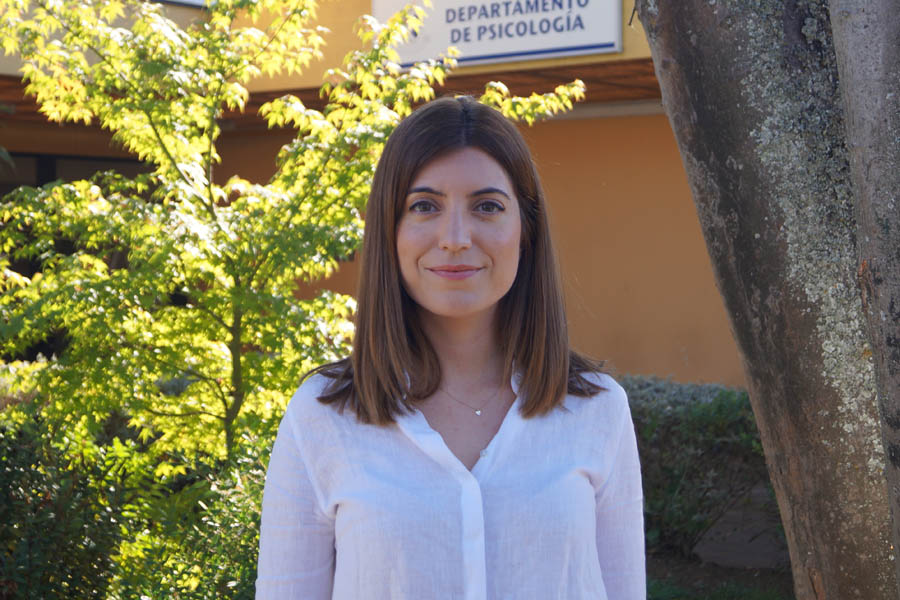|
“Regardless of the country we are analyzing, child abuse is a social problem that affects the life of a great number of children. And it is an important issue because we know that child abuse leads to disadvantages in our society regarding their well-being and their possibilities in the future,” the visiting researcher explains. |
The visit of Dr. Mónica López, a Spanish researcher of the University of Groningen (Netherlands), had several objectives. Her agenda was full of meetings with teachers, undergraduate and graduate students, and members of different organizations, in order to build new networks and to expand research in the field of child protection. Thanks to the program “Attraction of Advanced Human Capital from Abroad, Short-term visit (MEC)” of the National Commission for Scientific and Technological Research (CONICYT) and the work of the International Affairs Office, the Universidad de La Frontera was able to receive the high-level academic and to essentially contribute to the study of child protection systems in Chile, Latin America and Europe. The researcher was not only happy about this visit in the south of the world, but also felt challenged by the work program that has been designed to start with the first comparative analyses in different countries in Latin America. “This is something that really motivates me. The work with the UFRO Department of Psychology has given me the opportunity to receive a lot of feedback on how child protection systems have been applied in different countries on this continent,” she said. CHILD ABUSE Dr. Mónica López is a researcher working in the field of child abuse, which is a constant historic and cultural issue. “Regardless of the country we are analyzing, child abuse is a social problem that affects the life of a great number of children. And it is an important issue because we know that child abuse leads to disadvantages in our society regarding their well-being and their possibilities in the future,” she explains. For the ones who have been working on this issue for several years, the risks for children are latent. “We know that they show higher rates of mental health issues, school failure, drug and alcohol abuse, criminality, unemployment and poor housing conditions. That is why we are not only talking about high personal costs regarding child abuse, but also about social costs,” she added. In order to prevent this kind of situations, the different countries have developed child protection systems and policies that determine that children and families need child protection services and the kind of interventions they require. If the safety of a child is at risk, the social worker of the child protection service can decide to separate it from its family. The number of children who are living apart from their families is estimated at 143 million and the majority of them will be able to grow up in a family environment, whether with their own family members (this is what we call extended family foster care) or in foster or adoptive families. This intervention, called family placement, was one of the main points of interest in the study of Dr. López. “This intervention is the most effective in order to provide emotional stability for the child and shows the best results in adulthood. Nevertheless, an intervention is highly complex and full of challenges. What I am trying to do through my research is to determine how we could develop high-quality fostering programs in order to obtain the best results for the children,” she assured. Due to her international experience, she is always curious to understand how things work in other places, for example how other countries deal with child abuse. Although the countries in Western Europe do share similar principles regarding the need to protect vulnerable children, the child protection systems have been developing in very different ways. “When we study and compare different systems, we can question the policies and practices and compare the effects of different systems in the life of vulnerable children. Although variations exist, usually the argument is that there are two major approaches to respond to child abuse: one focuses on protection and the other on family care. That means that one approach focuses on the child and the other one on the family. This dichotomy is quite useful to identify the philosophic positions in politics or practices through international comparison,” she affirmed. “When you do an international comparison, it is possible to observe that child protection systems do indeed reach from a family-centered approach (for example in the Netherlands) to a protection-centered approach (for example in Chile). It is important to understand that these priorities (or this focus on the child or the family) help to determine the threshold of a country in order to define if a child has been mistreated and how to intervene in the best way. But, of course these two approaches are not static. They can vary over time, due to political and social changes,” Dr. Lopez pointed out.
ADVANCED HUMAN CAPITAL “Child protection is a research field that is actually present in the curriculum of the program and that we need to strengthen in order to create a balance between topics such as criminology and victimology. It is an opportunity to progress in the comparison of child protection systems in the UK, Germany and the Netherlands, which have been examined in detail by Dr. López of the University of Groningen,” Dr. Beatriz Vizcarra of the Department of Psychology, who is also part of the academic committee of the Program, explained.  Written by: UFRO Communications Office Written by: UFRO Communications OfficeThis email address is being protected from spambots. You need JavaScript enabled to view it. |





